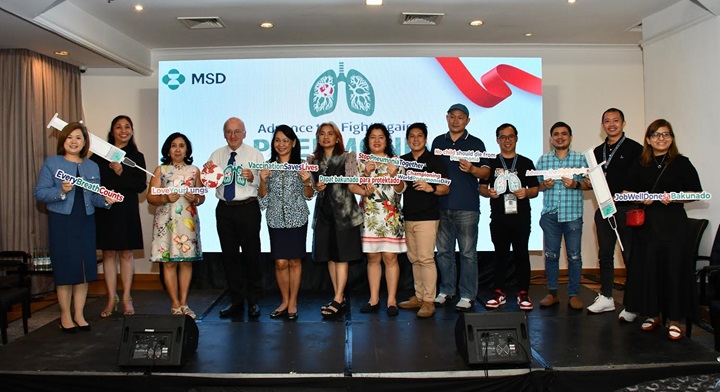
For World Pneumonia Day 2023, healthcare company MSD in the Philippines mounts a multi-stakeholder media forum titled “Advance the Fight Against Pneumonia,” to engage different sectors to strengthen the call to stop pneumonia together. The forum also facilitates expert talks and multi-stakeholder discussions about the challenges and opportunities surrounding pneumonia prevention, diagnosis, and treatment in the Philippines.
World Pneumonia Day, celebrated every November 12, is a yearly reminder that pneumonia is a life-threatening disease that can strike anyone, anytime, anywhere. The annual event not only draws more awareness to this severe lung infection, but also drives a whole-of society approach to combat this highly preventable disease.
Facing the burden of pneumonia head-on
Just hearing the word “pneumonia” can make people hold their breath. After all, this life-threatening disease affects a couple of internal organs vital to our survival—our lungs.
Pneumonia is usually the result of a pneumococcal infection, caused by bacteria called Streptococcus pneumoniae. Other different types of bacteria can also cause pneumonia, as well as viruses and, more rarely, fungi. Once a person is infected, this bacterial infection can cause swelling or inflammation of the tissues in one or both of our lungs. Symptoms of pneumonia develop within 24 to 48 hours and may include coughing, difficulty breathing, rapid heartbeat, and chest pains.
It remains a leading cause of death among older adults and people with chronic diseases. In the Philippines, pneumonia was the sixth leading cause of death in 2022, according to data from the Philippine Statistics Authority (PSA).
And pneumonia doesn’t just strike older adults—it’s also a leading cause of death among children. In fact, pneumonia kills more children than any other infectious disease, claiming the lives of over 700,000 children under five years old every year, including 200,000 newborns, according to data from the United Nations Children’s Fund (UNICEF). This means that every 43 seconds, a child dies from pneumonia.
This alarming reality persists despite the wide availability of healthcare innovations that can help prevent the spread of and manage this life-threatening lung disease. This is why the call to #StopPneumoniaTogether has become more critical now more than ever to improve equitable and sustained access to effective pneumonia prevention and control intervention.
Vaccination: The first line of defense against pneumonia
One can significantly lower their risk of contracting pneumonia through immunization. It is highly recommended for people at greater risk of catching pneumonia, namely: infants under two years old, older adults over 65 years old, people with weakened or compromised immune systems, and people with chronic health conditions that affect the heart and lungs.
The Philippine Society for Microbiology and Infectious Diseases (PSMID) recommends adults 50 years old and above to get immunized with pneumococcal polysaccharide vaccines (PPSV) or pneumococcal conjugate vaccines (PCV) to prevent invasive pneumococcal diseases.
The good news is, people can now secure their pneumococcal vaccinations from multiple access points – from hospitals and clinics, and at pharmacies and community drug stores as well.
Thanks to the Immunizing Pharmacist Certification Program of the Philippine Pharmacists Association (PPhA), pharmacists can now be trained and certified to become immunizing pharmacists, expanding the network of allied healthcare professionals pushing forward the fight against pneumonia.
And good news for our older adults, too: Filipinos aged 60 years old and above can get their pneumonia shots for free at the barangay health centers (BHCs) of their local government units (LGUs). This was made possible through the National Immunization Program (NIP) of the Department of Health (DOH).
Making healthcare accessible to all to #StopPneumoniaTogether
This World Pneumonia Day, join us in raising awareness about the burden of pneumonia and the importance of collective action to #StopPneumoniaTogether.
By strengthening and diversifying multi-stakeholder partnerships, we can make healthcare accessible to all, so the most vulnerable can access the whole spectrum of interventions against pneumonia—from prevention to early diagnosis and treatment. Together, we can make pneumonia a thing of the past.

